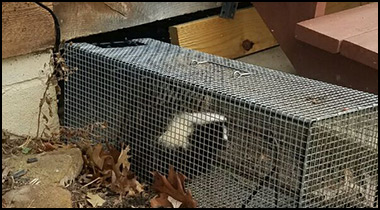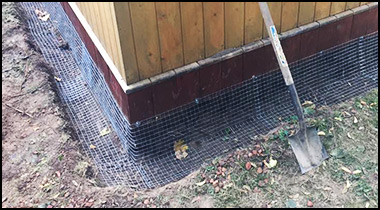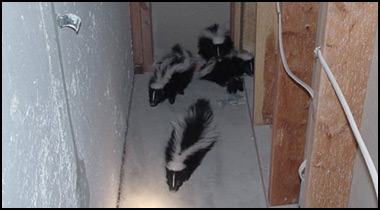Syracuse Skunk Removal Resources
Skunk Rehabber - Kindred Kingdoms Wildlife Inc: (315) 695-6418
Free Onondaga County Animal Services: (315) 249-9957
Humane Wildlife Trappers of Syracuse: 315-505-4769
If you need skunk control in Syracuse, you have a few options. First, you can attempt to solve the skunk problem yourself by reading our do-it-yourself guide. If you need outside help, you can also call Onondaga County Animal Services to see if they have any free resources or help for you - however, they primarily deal with dog and cat concerns. You can also call a local Syracuse wildlife rehabber, as they are typically a great resource for advice that is in the best welfare of the animal. If as a last resort you must hire a professional company, we recommend Humane Wildlife Trappers of Syracuse at 315-505-4769. To learn more about them or check their skunk removal prices, visit syracusepestanimal.com.

Syracuse Skunk Trapping and Removal

Preventative Repairs & Exclusion

Syracuse Skunk Removal From Structures
In many cases, preventative measures can solve your Syracuse skunk problem - keep garbage secured, pet food indoors, and most of all when it comes to skunks, secure the perimeter of your shed, porch, deck, or house with a barrier - lattice or steel mesh is good, and it keeps New York skunks from going under the structure. If trapping and removal of the skunk is the only option you have, please do so with the help of a local agency or professional company who knows how to do it humanely and legally. Browse the resources of this site for more educational information.
Frequently Asked Questions:
Prevention: How to Keep Skunks Away
What to do with a skunk after I catch it?
Is it legal for me to trap a skunk?
How to remove skunk odor
Is a skunk active during the daytime rabid?
What does skunk feces look like?
Syracuse Skunk Control Information: The scoop on the poop
Most wild animals carry bacteria and other dangerous toxins in their waste. When out in nature, the animals don't have access to shots such as rabies. Why? Well, because they are wild. Skunks are no different. While they are known for their rather pungent smell, they are actually helpful to the environment. However, just because they may not carry diseases and other harmful things themselves, that does not mean their waste does not.
Skunk's diets include bugs, nuts, fruits, leaves and smaller animals-such as mice. Their feces have been described almost cat like with a few minor differences. Just a quick note, you should never, ever, touch any kind of animal droppings with your bare hands. This goes especially for wild animals. We will discuss why it can be a danger in just a moment.
First of all, you need to make sure you know what you're looking at. Skunk feces are more tubular in shape and is more than likely found near their dens. If you suspect that you might have a skunk hanging around your property, pay close attention. If you find any piles close to openings under buildings or holes in the ground this could be a good indication.
Skunk droppings are easy to recognize because it often contains undigested bits of food. These things can be stuff like fur, feathers, seeds and grass.
Why is it dangerous to touch skunk droppings?
There are numerous reasons why it is dangerous to breath in, touch or come into contact with skunk droppings. For one, their droppings could and are likely to contain internal parasites like round worms that can easily be transmitted to humans simply by touch. You are what you eat? By eating small rodents, they are coming into contact with such things.
Aside from parasites, skunk droppings could very well contain harmful viruses. One of these is distemper. This particular disease is most commonly found in dogs, wolves, or coyotes.
Another extremely dangerous disease that can be contracted through the fecal matter of skunks is Hepatitis. This can be spread through the skunk droppings. It is dangerous because it can cause major organ failure in human as well as the possibility of developing certain kinds of cancer.
As we said earlier if you suspect that you might have a skunk in and/or around your home, it is okay to investigate it, however, be sure to wear protective gear such as face masks and gloves. It's always better to be safe than sorry
Remember, for free services you can try (315) 695-6418 or (315) 249-9957, but if you need to pay for professional help, check the prices at the syracusepestanimal.com website. Or follow our do-it-yourself guide!

